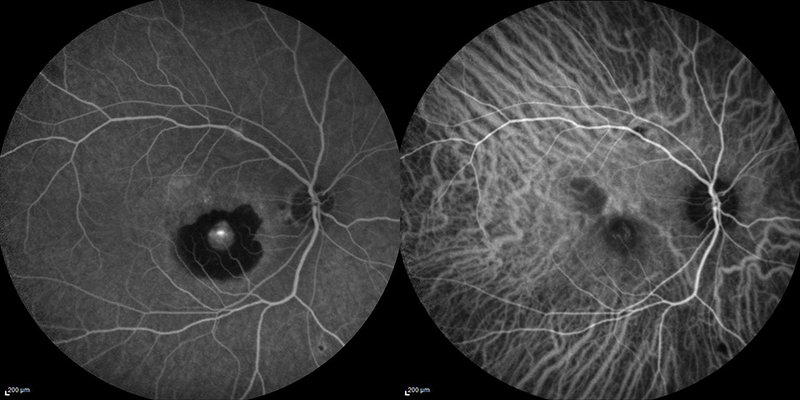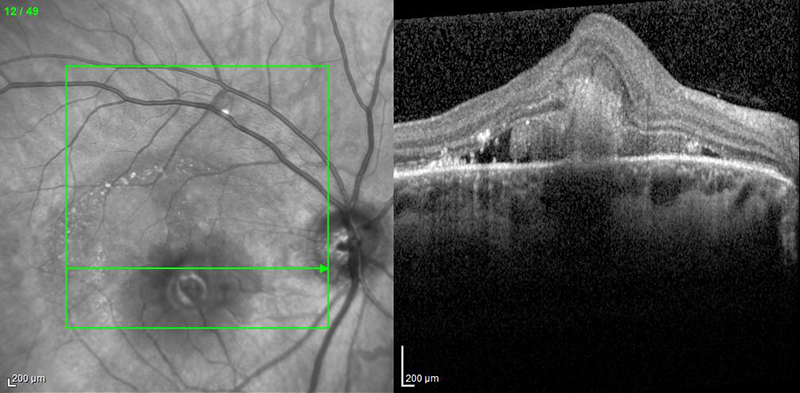Ocular Histoplasmosis Syndrome
 fluorescein and indocyanine green angiogram of ocular histoplasmosis syndrome with new macular hemorrhage
fluorescein and indocyanine green angiogram of ocular histoplasmosis syndrome with new macular hemorrhage
 OCT of ocular histoplasmosis syndrome with active hemorrhage
OCT of ocular histoplasmosis syndrome with active hemorrhage
What is Histoplasmosis?
Histoplasmosis is an infection that is caused when you breathe in spores of a fungus called histoplasma capsulatum. This fungus is usually found in places where bird or bat droppings accumulate. The infection begins in your lungs, and symptoms can range from mild to severe. Regardless of how severe the infection is, the fungus can move through the blood to the eye and cause Ocular Histoplasmosis Syndrome.
What is Ocular Histoplasmosis Syndrome?
Ocular Histoplasmosis Syndrome (OHS) occurs in a small percent of patients infected with Histoplasmosis when the fungus travels to the eye from the lung. Specifically, the fungus travels to the choroid, which is part of the retina. Once the fungus reaches the choroid, it causes scarring.
What are the symptoms of OHS?
Often, a histoplasmosis infection can be very mild, and symptoms can appear similar to a common cold. In its early stages OHS, or Ocular Histoplasmosis Syndrome, can have no symptoms. The scars of OHS that form inside the eye are called “Histo spots,” and these may be the only initial sign of an infection with histoplasmosis. These spots do not usually initially cause visual problems. For unclear reasons, they can cause complications several years or decades later. The scars from Histo spots can eventually cause abnormal growths of blood vessels underneath the retina. Once these abnormal blood vessels spread to the center of the eye (the macula) that we use for our fine vision, certain symptoms begin to appear once these vessels bleed or leak fluid:
- Blank spots in the central vision
- Distorted vision, causing straight lines to appear wavy or distorted
- Objects may appear to be different sizes, depending on which eye you are using
- Colors appear dull, and do not look the same in both eyes
- Flashes of light in the central vision
How is Ocular Histoplasmosis Syndrome diagnosed?
You will undergo a dilated eye exam so that your retina specialist can look for signs consistent with OHS such as histo spots and swelling of the retina, which indicate the growth of abnormal blood vessels. You may be asked to look at an Amsler grid to check for symptoms of Histoplasmosis (see above). Your specialist may use Optical Coherence Tomography (OCT) to take special detailed photographs of the eye. Also, fluorescein angiography, which is a special dye study, may be used in addition to the OCT to better see abnormal areas of the retina.
How is Ocular Histoplasmosis Syndrome Treated?
Ocular Histoplasmosis Syndrome usually requires no treatment if it is asymptomatic. Antifungal medications are not effective because there is no actual active infection in the eye. If the abnormal blood vessels develop, laser treatment or medication treatment can be used to stop bleeding and maintain the vision.
Laser treatment aims at focusing a beam at the area of the retina with the abnormal blood vessels. This causes a small burn at the involved area, destroying the abnormal vessels and preventing further bleeding and leakage. Medication treatments usually involve an injection procedure, during which your physician injects your eye with a special chemical that blocks the growth of the abnormal blood vessels. This medication is called anti- VEGF. Often, multiple anti-VEGF injections are required over the course of several months for continued benefit. Quite often, the vision improves with the use of injected medications for the treatment of ocular histoplasmosis.